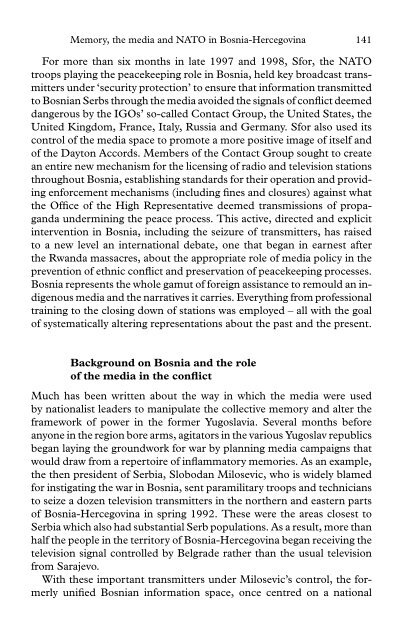Memory and Power in Post-War Europe: Studies in the Presence of ...
Memory and Power in Post-War Europe: Studies in the Presence of ...
Memory and Power in Post-War Europe: Studies in the Presence of ...
You also want an ePaper? Increase the reach of your titles
YUMPU automatically turns print PDFs into web optimized ePapers that Google loves.
<strong>Memory</strong>, <strong>the</strong> media <strong>and</strong> NATO <strong>in</strong> Bosnia-Hercegov<strong>in</strong>a 141<br />
For more than six months <strong>in</strong> late 1997 <strong>and</strong> 1998, Sfor, <strong>the</strong> NATO<br />
troops play<strong>in</strong>g <strong>the</strong> peacekeep<strong>in</strong>g role <strong>in</strong> Bosnia, held key broadcast transmitters<br />
under ‘security protection’ to ensure that <strong>in</strong>formation transmitted<br />
to Bosnian Serbs through <strong>the</strong> media avoided <strong>the</strong> signals <strong>of</strong> conflict deemed<br />
dangerous by <strong>the</strong> IGOs’ so-called Contact Group, <strong>the</strong> United States, <strong>the</strong><br />
United K<strong>in</strong>gdom, France, Italy, Russia <strong>and</strong> Germany. Sfor also used its<br />
control <strong>of</strong> <strong>the</strong> media space to promote a more positive image <strong>of</strong> itself <strong>and</strong><br />
<strong>of</strong> <strong>the</strong> Dayton Accords. Members <strong>of</strong> <strong>the</strong> Contact Group sought to create<br />
an entire new mechanism for <strong>the</strong> licens<strong>in</strong>g <strong>of</strong> radio <strong>and</strong> television stations<br />
throughout Bosnia, establish<strong>in</strong>g st<strong>and</strong>ards for <strong>the</strong>ir operation <strong>and</strong> provid<strong>in</strong>g<br />
enforcement mechanisms (<strong>in</strong>clud<strong>in</strong>g f<strong>in</strong>es <strong>and</strong> closures) aga<strong>in</strong>st what<br />
<strong>the</strong> Office <strong>of</strong> <strong>the</strong> High Representative deemed transmissions <strong>of</strong> propag<strong>and</strong>a<br />
underm<strong>in</strong><strong>in</strong>g <strong>the</strong> peace process. This active, directed <strong>and</strong> explicit<br />
<strong>in</strong>tervention <strong>in</strong> Bosnia, <strong>in</strong>clud<strong>in</strong>g <strong>the</strong> seizure <strong>of</strong> transmitters, has raised<br />
to a new level an <strong>in</strong>ternational debate, one that began <strong>in</strong> earnest after<br />
<strong>the</strong> Rw<strong>and</strong>a massacres, about <strong>the</strong> appropriate role <strong>of</strong> media policy <strong>in</strong> <strong>the</strong><br />
prevention <strong>of</strong> ethnic conflict <strong>and</strong> preservation <strong>of</strong> peacekeep<strong>in</strong>g processes.<br />
Bosnia represents <strong>the</strong> whole gamut <strong>of</strong> foreign assistance to remould an <strong>in</strong>digenous<br />
media <strong>and</strong> <strong>the</strong> narratives it carries. Everyth<strong>in</strong>g from pr<strong>of</strong>essional<br />
tra<strong>in</strong><strong>in</strong>g to <strong>the</strong> clos<strong>in</strong>g down <strong>of</strong> stations was employed – all with <strong>the</strong> goal<br />
<strong>of</strong> systematically alter<strong>in</strong>g representations about <strong>the</strong> past <strong>and</strong> <strong>the</strong> present.<br />
Background on Bosnia <strong>and</strong> <strong>the</strong> role<br />
<strong>of</strong> <strong>the</strong> media <strong>in</strong> <strong>the</strong> conflict<br />
Much has been written about <strong>the</strong> way <strong>in</strong> which <strong>the</strong> media were used<br />
by nationalist leaders to manipulate <strong>the</strong> collective memory <strong>and</strong> alter <strong>the</strong><br />
framework <strong>of</strong> power <strong>in</strong> <strong>the</strong> former Yugoslavia. Several months before<br />
anyone <strong>in</strong> <strong>the</strong> region bore arms, agitators <strong>in</strong> <strong>the</strong> various Yugoslav republics<br />
began lay<strong>in</strong>g <strong>the</strong> groundwork for war by plann<strong>in</strong>g media campaigns that<br />
would draw from a repertoire <strong>of</strong> <strong>in</strong>flammatory memories. As an example,<br />
<strong>the</strong> <strong>the</strong>n president <strong>of</strong> Serbia, Slobodan Milosevic, who is widely blamed<br />
for <strong>in</strong>stigat<strong>in</strong>g <strong>the</strong> war <strong>in</strong> Bosnia, sent paramilitary troops <strong>and</strong> technicians<br />
to seize a dozen television transmitters <strong>in</strong> <strong>the</strong> nor<strong>the</strong>rn <strong>and</strong> eastern parts<br />
<strong>of</strong> Bosnia-Hercegov<strong>in</strong>a <strong>in</strong> spr<strong>in</strong>g 1992. These were <strong>the</strong> areas closest to<br />
Serbia which also had substantial Serb populations. As a result, more than<br />
half <strong>the</strong> people <strong>in</strong> <strong>the</strong> territory <strong>of</strong> Bosnia-Hercegov<strong>in</strong>a began receiv<strong>in</strong>g <strong>the</strong><br />
television signal controlled by Belgrade ra<strong>the</strong>r than <strong>the</strong> usual television<br />
from Sarajevo.<br />
With <strong>the</strong>se important transmitters under Milosevic’s control, <strong>the</strong> formerly<br />
unified Bosnian <strong>in</strong>formation space, once centred on a national
















